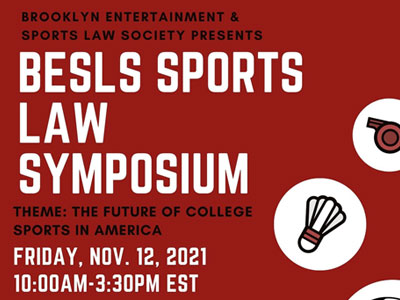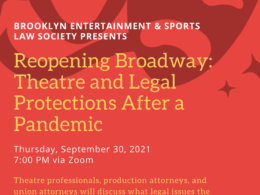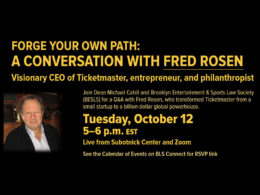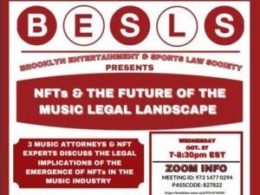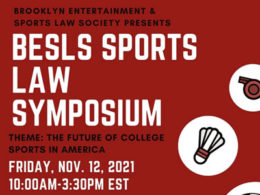On Friday, November 12th, BESLS’s hosted its first annual Sports Law Symposium, a day-long event including three interesting panels discussing: (1) the evolving Name, Image & Likeness (“NIL”) regulatory landscape; (2) Title IX Issues in College Sports and; (3) Alston and the Future of NCAA Governance.
Professor Thomas A. Baker III of the University of Georgia spearheaded the discussion about the upshot of the Supreme Court’s Alston decision with panelists Martin Edel, Adam Dale, & Troy Dannen. Martin Edel is a professor of antitrust law at Brooklyn Law School, Adam Dale is a practicing sports, antitrust, and labor law attorney who regularly represents athletes and other high profile sports industry clients, and Troy Dannen serves as the current Athletic Director at Tulane University. These jobs, while different on a day-to-day basis, saw an intersection with the Alston decision and provided our panelists with their own unique perspective on the future of NCAA governance.
The discussion began by highlighting the uncertainties created by the Alston decision. Alston represents a watershed moment in amateur athletics because its holding establishes that college athletes can receive compensation for anything education related. While the Court in Alston articulated that direct “pay-for-play” continues to have enough procompetitive effects to pass the muster of a “rule of reason” analysis, the murkiness in what is seen as education related and what is not remains unresolved. Seemingly the Alston decision opened the floodgates for amateur athletes to receive any sort of compensation that falls short of direct “pay-for-play.” Unsurprisingly, shortly after the Alston decision a flurry of states adopted laws relating to amateur athlete NIL compensation.
When asked how college athletics will change from what it was prior to the Alston decision, Mr. Dale stated: “Alston is a dramatic shift for how the NCAA operates under the law. The NCAA was seeking an anti-trust exemption based on dicta from Justice Stevens in the Supreme Court’s 1980s Board of Regents case. The NCAA has successfully grasped on to say courts don’t have right to get involved in NCAA amateurism rules, and the NCAA wanted the Alston court to reaffirm that dicta and continue to give the NCAA discretion in these matters. Instead, the Supreme Court in Alston emphatically rejected this premise and said the NCAA could not collude on these labor rules. Alston got rid of the generous presumption the NCAA had in setting the amateurism rules. Whereas the NCAA previously had the discretion to set these amateurism rules, this presumption clearly no longer exists. Now it is clear the Supreme Court will scrutinize the NCAA, and Justice Kavanaugh’s concurrence even suggested that the scheme in its entirety needs to be reevaluated. Those who believed NCAA was appropriately setting national rules it is now accepted that one size does not fit all.”
Next the discussion moved to how the Alston decision has affectedMr. Dannen’s, Tulane University’s current Athletic Director, job. Mr. Dannen stated: “Alston opened the doors for the NCAA to rethink things they were previously unwilling to rethink in terms of its philosophy, and the next step is going to get messy. When people think of the NCAA, they think of the NCAA as a whole, not in terms of its specific conferences. In response to the subsequent NIL legislation, the NCAA essentially delegated the responsibility of setting rules regarding NIL’s to the conferences. Now we are left wondering what can and should be deregulated, and what has to be deregulated in a post-Alston world. Currently, a lot of individual schools are empowered to make rules regarding NIL regulations and then conferences will be tasked with reregulating these rules.”
Navigating these regulation ambiguities presents a difficult road ahead for schools to navigate, especially when it is likely that they will have to pander to the needs of the top revenue producing institutions. For example, the word “amateurism” is not even found in the most recent version of the NCAA’s Constitution, this leaves us to wonder “what is amateurism in the first place?” Mr. Dannen says that the NCAA has essentially blurred the line between amateur and professional into nonexistence. “Everything but pay-for-play is on the table. Society has been driving this issue toward the scrutiny of the Alston case for quite some time.”
Since the smaller revenue producing schools are largely at the mercy of the top revenue producing schools, is there the potential of full-on cessation? When asked point-blank of such possibility, Dannen stated: “If they did it would be catastrophic to the 1100 schools left, and it seems like a last resort. Smaller schools have to recognize the unique needs of the top schools that drive the NCAA, revenue wise. We invited politicians to get involved in our business and this is a dangerous slope. It would be terrible for us to allow for certain institutions to get away from the current system and take all the revenue with them. There will need to be concessions made. Schools must recognize the needs of the major players.”
In the end, while pay-for-play is out of the question for now. Schools must try and invest as much as they can to enhance the student athlete experience, with the caveat of not allowing amateur sports to transform into full-fledged professionalism. However, on this issue, it seems the panelists had some disagreement. While Professor Edel raised concerns regarding the potential destruction of a student athlete’s motivation to pursue their education if paid, believing they would be less inclined to attend class. It seems Adam Dale would disagree.
When asked if they believed potential athlete compensation influenced consumer interest in sports, he stated that he does not see why there a line between what pay is permissible. “If we [college athletes] truly were amateur and got accepted to schools based on academic merit this may be different, but this is not apparent at all. All sectors, profit and non-profit [making] college sports are treated like professional sports in terms of time commitment. Research suggests we like college sports because we have an affinity for a school, not because we care about the athletes getting paid or not, we like the school because we like the school. This is why we should want to give a little bit more to these athletes.”
Discussing the benefits such compensation may have on the college athlete’s livelihood, Moderator Baker suggested it would enhance the college experience as a whole, to which both Mr. Dale and Mr. Dannen seemed to agree. On this point Mr. Dale stated: “to take away the stress of needing money and having compensation to be able to give their family if they need to, or to spend it on hanging out with their friends, that will make it a lot easier on their lives.”
With the hour winding the last question posed by the moderator was: now that Alston has effectively placed the burden on the conference to regulate these matters is it possible that the individual conferences can face antitrust scrutiny? Professor Edel stated, “no I do not think so, it seems to me that the market is too small.” To which Mr. Dale replied, “the market would probably be too small, but it would depend on the given facts.” With the last word Mr. Dannen did not disappoint stating, “you should see the figures of the most recently negotiated SEC TV contract, it is massive, the answer may be no but with the size of the SEC’s revenue this will be a question that a court is asked.”
We thank all of our panelists for partaking in this wonderful symposium, and sincerely look forward to following future NCAA developments regarding student athlete compensation.
Written by: Jake Sperber
Jake is a 2023 J.D. Candidate at Brooklyn Law School
